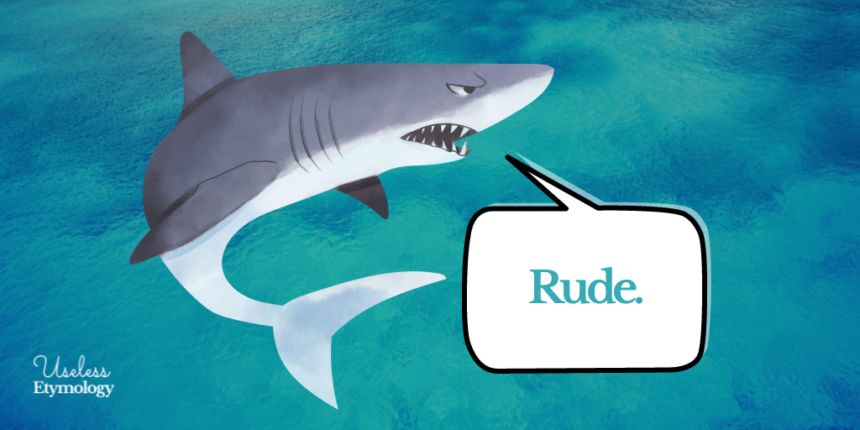Note: This is an excerpt from my forthcoming book Words from Hell: Unearthing the darkest secrets of English etymology (Chambers, 2023).
Sharks were named after terrible people.
That’s right. “Shark” was a word for a human before it was a word for a fish.
Old English didn’t have a general word for the broad group of cartilaginous fish species that we now call sharks. It did have some more specific names. Some were often called “houndfish” or “sea dogs,” which survives in the shark species now known as “dogfish.” Hammerheads were originally and less scarily called “balance-fish” in English until at least the 1740s.
Meanwhile, the Old Norse word for a shark was har, related to other Germanic words for sharks such as the Dutch haai and German Hai.
The word “shark” (or “sharker”) first appeared in English in the 1400s, and at that time it meant “scoundrel,” “villain,” or “swindler.” It wasn’t a word for the animal in English until the 1700s. Its exact origin isn’t known, but it may be from the Middle High German schürgen, meaning “to poke” or “to stir” and related to the German Schurke “villain.”
The switch is thought to have been due to a comparison between predatory pickpockets and thieves and the behavior of the animals.
It has also been theorized that the Mayan word xoc may have been a word for “shark” that made its way to English via colonization. After all, English did briefly use the word “tiburon” for sharks in the 16th century, and that is thought to be from an indigenous South American word. But the xoc theory falls apart because the timeline doesn’t add up: “Shark” is recorded in reference to people before English could have reasonably adopted a Mayan word for the animal.
All of the above means that the term “loan shark” for a lender who offers loans at dramatically high interest rates (then often uses illegal tactics to collect moneys owed) is closer to the original sense of the word. However, though the practice has been infamous for centuries, the term may not have arisen until the 20th century, so whether it’s inspired by human predators or aquatic ones is unknown.
Meanwhile, the unrelated Greek and French words for “shark” (as in the animal) are terrifying:
French requin, literally “grimacer”
Greek karcharías, literally “sharp/jagged biter”
Moby Dick author Herman Melville (1819–91) has a deeply entertaining discussion about different shark species with humanoid (and disturbing) personalities in his 1849 book Mardi: and a Voyage Thither, including:
The Brown shark, or “sea attorney, so called by sailors; a grasping, rapacious varlet.”
The Tiger Shark, who has a “rude, savage swagger,” as well as “a distended mouth and collapsed conscience, swimming about seeking whom he might devour”.
And of course, “the ghastly White Shark… a ghost of a fish” that moves with “horrific serenity of aspect” and sports a “bottomless white pit of teeth.”
Read more in Words from Hell.





